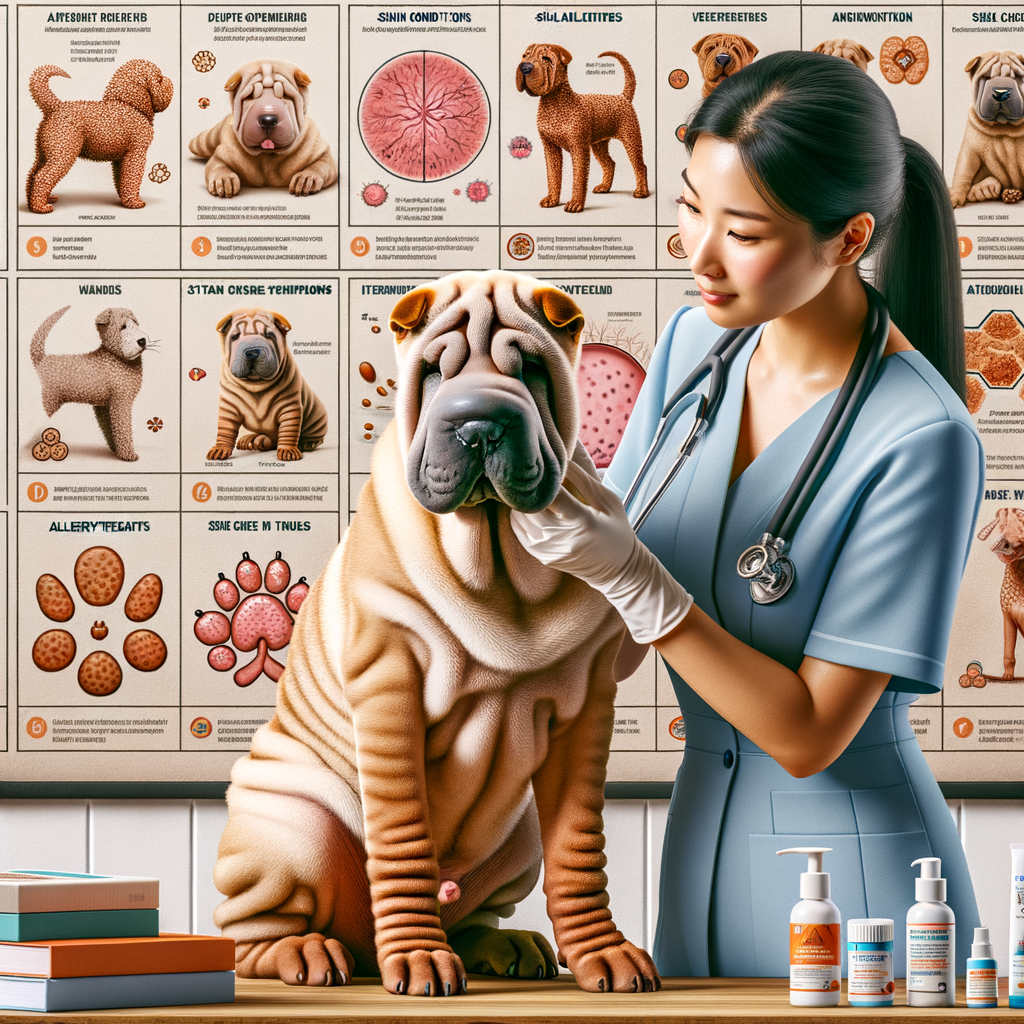
Introduction to Shar Pei Skin Allergies
Shar Peis, with their unique wrinkled skin and lovable personalities, are a favorite among dog lovers. However, their distinctive skin also makes them susceptible to certain skin conditions, including allergies. In this article, we will delve into the world of Shar Pei skin allergies, providing you with the knowledge you need to keep your furry friend healthy and comfortable.
- Overview of Shar Pei Skin Conditions
- Importance of Understanding Shar Pei Skin Allergies
Shar Peis are known for their wrinkled skin, which unfortunately makes them prone to a variety of skin conditions. These can range from mild irritations to more severe conditions like Shar Pei Fever, which can cause swelling and discomfort. Among these conditions, skin allergies are quite common. These allergies can be triggered by a variety of factors, including certain foods, environmental allergens like pollen or dust mites, and even certain materials like plastic or rubber.
Understanding Shar Pei skin allergies is crucial for any Shar Pei owner. Not only can these allergies cause discomfort and distress for your pet, but if left untreated, they can lead to more serious health issues. By understanding the causes, symptoms, and treatments for these allergies, you can help ensure your Shar Pei lives a long, healthy, and happy life.
Throughout this article, we will explore how to identify skin allergies in Shar Peis, how they are diagnosed, and the various treatment options available. We hope this information will serve as a valuable resource for you and your Shar Pei.
Identifying Skin Allergies in Shar Peis
Understanding the types of allergies that commonly affect Shar Peis is the first step in identifying and managing skin allergies in this breed. Here, we will explore the three most common types of allergies in Shar Peis: food allergies, environmental allergies, and chemical allergies.
Common Allergies in Shar Peis
- Food Allergies
Food allergies are quite common in Shar Peis. These can be triggered by certain proteins or grains found in their diet. Symptoms can include itching, redness, and inflammation of the skin. It’s important to note that food allergies can develop at any age, so even if your Shar Pei has been eating the same food for years, they can still develop an allergy.
- Environmental Allergies
Environmental allergies, also known as atopic dermatitis, are caused by allergens in the environment such as pollen, dust mites, and mold. These allergens can cause skin irritation, leading to itching and inflammation. Seasonal changes can often exacerbate these symptoms.
- Chemical Allergies
Chemical allergies in Shar Peis can be caused by a reaction to certain cleaning products, detergents, or even certain types of dog shampoos. These allergies can cause a range of skin symptoms, including redness, itching, and hives. It’s crucial to identify and remove the source of the chemical allergen to alleviate symptoms.
By understanding these common allergies, you can better identify potential triggers and symptoms in your Shar Pei. In the next section, we will discuss the common symptoms of skin allergies in Shar Peis and how to recognize them.
Shar Pei Allergy Symptoms
When it comes to identifying skin allergies in Shar Peis, it’s important to be aware of the symptoms. These symptoms can be a clear indication that your pet is suffering from an allergy. Here are the most common symptoms to look out for:
- Excessive scratching: One of the first signs of an allergy in Shar Peis is excessive scratching. This is because the allergen irritates the skin, causing your pet to scratch more than usual. It’s not just a little itch; it’s a constant, persistent need to scratch.
- Red, inflamed skin: If your Shar Pei is suffering from an allergy, their skin may become red and inflamed. This is a reaction to the allergen and can be particularly noticeable in areas where the skin is thin or sensitive, such as the belly or inner thighs.
- Chronic ear infections: Allergies can also lead to chronic ear infections in Shar Peis. The allergen can cause inflammation in the ear canal, leading to an infection. If your pet is frequently shaking their head or scratching their ears, it could be a sign of an ear infection.
- Changes in behavior: Allergies can also affect your pet’s behavior. If your Shar Pei is feeling uncomfortable or in pain due to their allergy, they may become more irritable or less active than usual. Changes in behavior are always worth noting, as they can be a sign of underlying health issues.
Remember, these symptoms can be a sign of a skin allergy in your Shar Pei. If you notice any of these signs, it’s important to seek veterinary advice as soon as possible. Early diagnosis and treatment can help to reduce the discomfort and prevent further complications.
Skin Allergy Diagnosis in Shar Peis
When it comes to diagnosing skin allergies in Shar Peis, it’s crucial to consult a professional. A veterinarian will have the knowledge and tools necessary to accurately identify and treat your pet’s condition.
Consulting a Veterinarian
There are two key aspects to consider when consulting a veterinarian for your Shar Pei’s skin allergies: the importance of a professional diagnosis and what to expect during a vet visit.
- Importance of Professional Diagnosis
- What to Expect During a Vet Visit
While it might be tempting to diagnose your pet’s condition based on symptoms you observe, it’s essential to get a professional diagnosis. Skin allergies in Shar Peis can be complex and may mimic other skin conditions. A veterinarian can conduct thorough testing to accurately identify the allergy. This ensures your pet receives the correct treatment, preventing further discomfort or complications.
During a vet visit, your Shar Pei will undergo a physical examination. The vet will check for signs of skin allergies such as redness, swelling, or itching. They may also perform skin tests or blood tests to identify the specific allergen causing the reaction. It’s important to provide the vet with as much information as possible about your pet’s symptoms and behavior. This will help in making an accurate diagnosis.
Remember, early detection and treatment of skin allergies can significantly improve your Shar Pei’s quality of life. Don’t hesitate to consult a vet if you notice any changes in your pet’s skin or behavior.
Home Observation
Observing your Shar Pei at home is a crucial step in identifying skin allergies. It involves two main aspects:
- Monitoring your Shar Pei’s behavior
- Keeping a record of symptoms
Monitoring your Shar Pei’s Behavior
Changes in your Shar Pei’s behavior can be a sign of discomfort caused by skin allergies. Pay close attention to how your pet behaves. For instance, if your Shar Pei is scratching more than usual, it may be a sign of an allergic reaction.
Other behaviors to watch out for include excessive licking, rubbing against furniture, or showing signs of restlessness. These behaviors may indicate that your pet is trying to soothe an itchy or painful area on their skin.
Keeping a Record of Symptoms
It’s important to keep a detailed record of your Shar Pei’s symptoms. This can help your veterinarian make a more accurate diagnosis. Note down any changes in your pet’s behavior, as well as any physical symptoms such as redness, swelling, or hair loss.
Try to record the frequency and severity of these symptoms. For example, you could create a table like the one below:
| Date | Behavior | Physical Symptoms | Severity |
|---|---|---|---|
| March 1 | Excessive scratching | Redness on belly | Moderate |
| March 2 | Restlessness, licking paws | Swelling on paws | Severe |
Remember, early detection of skin allergies can lead to more effective treatment. Therefore, home observation of your Shar Pei is a crucial part of managing their health.
Treating Skin Allergies in Shar Peis
When it comes to the health of your Shar Pei, skin allergies can be a common issue. However, with the right treatment, your furry friend can lead a comfortable and happy life. Let’s explore some of the most effective treatments for skin allergies in Shar Peis.
Skin Allergy Treatments for Shar Peis
There are several ways to treat skin allergies in Shar Peis. The best treatment for your pet will depend on the severity of their symptoms and the cause of their allergy. Here are some common treatments:
- Medications and creams: Your vet may prescribe medications or creams to help relieve your Shar Pei’s skin allergy symptoms. These can include antihistamines to reduce itching and inflammation, and topical creams to soothe irritated skin. Always follow your vet’s instructions when using these treatments.
- Special diets: Some Shar Peis may have food allergies that contribute to their skin issues. In these cases, a special diet may be recommended. This could involve avoiding certain foods, or feeding your pet a diet specifically designed for dogs with skin allergies. It’s important to consult with your vet before making any major changes to your pet’s diet.
- Environmental changes: Sometimes, skin allergies can be triggered by something in your Shar Pei’s environment. This could be anything from dust mites to certain types of grass. If this is the case, you may need to make some changes to your pet’s environment to help reduce their exposure to these allergens.
Remember, every Shar Pei is unique and what works for one may not work for another. It’s important to work closely with your vet to find the best treatment for your pet’s skin allergies.
Shar Pei Allergy Care
When it comes to managing skin allergies in Shar Peis, there are three crucial areas to focus on. These include regular grooming, proper nutrition, and regular vet check-ups. Let’s delve into each of these areas to understand their importance.
- Regular Grooming
- Proper Nutrition
- Regular Vet Check-ups
Grooming is not just about keeping your Shar Pei looking good; it’s also about maintaining their skin health. Regular grooming helps to remove dead skin cells, dirt, and allergens that can irritate the skin and cause allergies. Brushing your Shar Pei’s coat at least once a week can help to keep their skin clean and healthy. Additionally, regular baths with hypoallergenic shampoo can help to soothe irritated skin and reduce allergens.
What your Shar Pei eats can significantly impact their skin health. Some dogs may be allergic to certain ingredients in dog food, leading to skin allergies. A diet rich in Omega-3 fatty acids can help to improve skin health and reduce inflammation. Foods like fish, flaxseeds, and chia seeds are rich in Omega-3s. However, it’s always best to consult with your vet before making any significant changes to your dog’s diet.
Regular vet check-ups are essential for monitoring your Shar Pei’s skin health. Your vet can identify any potential skin issues early and provide appropriate treatment. They can also provide advice on grooming and nutrition to help manage your dog’s skin allergies. It’s recommended to have your Shar Pei checked at least once a year, or more frequently if they have a history of skin allergies.
In conclusion, managing skin allergies in Shar Peis involves a combination of regular grooming, proper nutrition, and regular vet check-ups. By focusing on these areas, you can help to keep your Shar Pei’s skin healthy and reduce the risk of skin allergies.
Conclusion: Shar Pei Skin Care
As we conclude our discussion on Shar Pei skin allergies, it’s crucial to underscore the importance of regular care and observation, as well as the impact of proper care on a Shar Pei’s quality of life.
- Importance of Regular Care and Observation
- Impact of Proper Care on Shar Pei’s Quality of Life
Regular care and observation are key to maintaining your Shar Pei’s skin health. This involves routine grooming, regular vet check-ups, and keeping an eye out for any changes in your dog’s skin. By doing so, you can catch any potential issues early, before they become serious problems. Remember, prevention is always better than cure.
Proper care greatly impacts a Shar Pei’s quality of life. A dog with healthy skin is a happy and active dog. Skin allergies can cause discomfort and distress, affecting your pet’s mood and activity levels. By ensuring your Shar Pei receives the right care, you’re not just improving their skin health, but also contributing to their overall happiness and well-being.
In conclusion, taking care of your Shar Pei’s skin is not just about preventing allergies. It’s about ensuring they lead a comfortable, happy life. As a responsible pet owner, it’s your duty to provide the best care for your furry friend. Remember, a healthy Shar Pei is a happy Shar Pei.














